
James Shirley was an English dramatist.
The History of Cardenio, often referred to as simply Cardenio, is a lost play, known to have been performed by the King's Men, a London theatre company, in 1613. The play is attributed to William Shakespeare and John Fletcher in a Stationers' Register entry of 1653. The content of the play is not known, but it was likely to have been based on an episode in Miguel de Cervantes's Don Quixote involving the character Cardenio, a young man who has been driven mad and lives in the Sierra Morena. Thomas Shelton's translation of the First Part of Don Quixote was published in 1612 and would thus have been available to the presumed authors of the play.

Double Falsehood or The Distrest Lovers is a 1727 play by the English writer and playwright Lewis Theobald, although the authorship has been contested ever since the play was first published, with some scholars considering that it may have been written by John Fletcher and William Shakespeare. Some authors believe that it may be an adaptation of a lost play by Shakespeare and Fletcher known as Cardenio. Theobald himself claimed his version was based on three manuscripts of an unnamed lost play by Shakespeare.
The Night Walker, or The Little Thief is an early seventeenth-century stage play, a comedy written by John Fletcher and later revised by his younger contemporary James Shirley. It was first published in 1640.
The Coronation is a Caroline era stage play, a tragicomedy written by James Shirley, and notable for the tug-of-war of authorship claims in which it was involved in the middle seventeenth century.
Hyde Park is a Caroline era comedy of manners written by James Shirley, and first published in 1637.
The Young Admiral is a Caroline era tragicomedy written by James Shirley, and first published in 1637. It has often been considered Shirley's best tragicomedy, and one of his best plays.
The Witty Fair One is a Caroline era stage play, an early comedy by James Shirley. Critics have cited the play as indicative of the evolution of English comic drama from the humors comedy of Ben Jonson to the Restoration comedy of Wycherley and Congreve, and the comedy of manners that followed.
Love's Sacrifice is a Caroline era stage play, a tragedy written by John Ford, and first published in 1633. It is one of Ford's three surviving solo tragedies, the others being The Broken Heart and 'Tis Pity She's a Whore.
The Royal Master is a Caroline era stage play, a comedy written by James Shirley, and first published in 1638. The play is "ranked by many critics as Shirley's ablest work in romantic comedy...It is a play notable for well-knit plot, effective scenes, pleasing characterization, clever dialogue, and poetic atmosphere."
The Example is a Caroline era stage play, a comedy written by James Shirley, first published in 1637. The play has repeatedly been acclaimed both as one of Shirley's best comedies and one of the best works of its generation. And it provides one of the clearest demonstrations in Shirley's canon of the influence of the works of Ben Jonson on the younger dramatist's output.
The Grateful Servant is a Caroline era stage play, a tragicomedy written by James Shirley, and first published in 1630. Its publication marked a significant development in Shirley's evolving literary career.
The Imposture is a Caroline era stage play, a tragicomedy written by James Shirley and first published in 1652. Shirley himself considered The Imposture the best of his romantic comedies.
The Guardian is a Caroline era stage play, a comedy written by Philip Massinger, dating from 1633. "The play in which Massinger comes nearest to urbanity and suavity is The Guardian...."
The Parliament of Love is a late Jacobean era stage play, a comedy written by Philip Massinger. The play was never printed in the seventeenth century, and survived only in a defective manuscript – making it arguably the most problematical work in the Massinger canon.
The Lovers' Progress is an early seventeenth-century stage play, a tragicomedy written by John Fletcher and Philip Massinger. As its multiple titles indicate, the play has a complex history and has been a focus of controversy among scholars and critics.
The Spanish Curate is a late Jacobean era stage play, a comedy written by John Fletcher and Philip Massinger. It premiered on the stage in 1622, and was first published in 1647.

A King and No King is a Jacobean era stage play, a tragicomedy written by Francis Beaumont and John Fletcher and first published in 1619. It has traditionally been among the most highly praised and popular works in the canon of Fletcher and his collaborators.
Women Pleased is a late Jacobean era stage play, a tragicomedy by John Fletcher that was originally published in the first Beaumont and Fletcher folio of 1647.
Andrew Crooke and William Cooke were London publishers of the mid-17th-century. In partnership and individually, they issued significant texts of English Renaissance drama, most notably of the plays of James Shirley.



